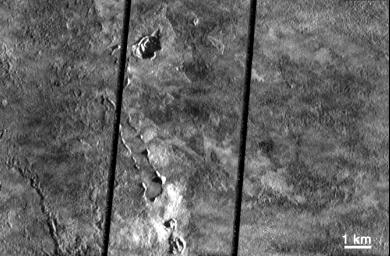This very high resolution (19 meters, or about 21 yards, per picture element) mosaic shows the complex collection of lava flows, pits, domes, and possibly rafted plates of lava on Io. The images were taken by NASA's Galileo spacecraft on October 11, 1999 during its 24th orbit. The observation targeted a 70-kilometer (44-mile) long lava flow that erupted from Pillan Patera in June 1997. Rafted plates like those that appear in this image are also seen on Earth and Mars; they may indicate that the lava was flowing rapidly enough to rip apart the crust as it formed. Galileo scientists believe that most of these lava flows, which cover about 400square kilometers (160 square miles), were emplaced in about two weeks. A shadow that appears to be cast by the edge of an individual lava flow (lower left) indicates that the flow is 10 meters, or yards, thick.
The pits and domes, which range from a few tens of meters to many hundreds of meters in scale, are more difficult to explain. One possibility is that these are the result of interactions between the hot lava and Io's volatile-rich surface. Such vents are observed on Earth when lava flows interact with ground water or ice far from the actual source of the lava.
A joint observation of Pillan on June 27, 1996 by Galileo's onboard camera and near-infrared mapping spectrometer provided a temperature estimate forth lava of 1,900 Kelvins (3,900 degrees Fahrenheit), hundreds of degrees hotter than terrestrial eruptions. Although the lava flows have cooled significantly since then, they were still warm at the time of these observations.
North is to the top of the picture and the Sun illuminates the surface from the right. The images were taken on October 11, 1999 at a distance of 1,900 kilometers (1,200 miles) from Io. The large doses of radiation to which the spacecraft is subjected each time it passes close to Jupiter caused a problem with Galileo's camera, which resulted in scrambling of these images. Engineers at NASA's Jet Propulsion Laboratory, Pasadena, CA, were able to reconstruct the images, but black stripes remain where some data could not be recovered.
JPL manages the mission for NASA's Office of Space Science, Washington, D.C. JPL is a division of the California Institute of Technology, Pasadena, CA.
This image and other images and data received from Galileo are posted on the Galileo mission home page at http://solarsystem.nasa.gov/galileo/. Background information and educational context for the images can be found at http://galileo.jpl.nasa.gov/gallery/io.cfm.

 Planetary Data System
Planetary Data System












